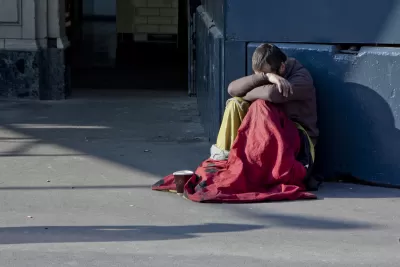Formerly playing host to almost double the homeless population of Dallas, Houston has addressed the problem with some success over the past decade. Meanwhile, rising costs have fueled a growing crisis in Dallas.

Homeless counts in the Houston area show a very promising 54 percent decrease since 2011, Juan Pablo Garnham reports. Meanwhile, the problem is growing in other major Texas metros, especially Dallas.
Part of the secret behind Houston's success, Garnham writes, is HUD assistance. In a process beginning in 2010, HUD designated the Houston metro area as a priority community of assistance, opening up channels of funding. Beginning with military veterans, the city launched a plan that relied heavily on improved coordination between agencies and organizations. The Houston Housing Authority has been a central part of the effort to create permanent supportive housing for those on the streets.
Houston also debuted a digital system to track cases of homelessness and manage responses. "Most cities today have [a Homeless Management Information System] in place, but Houston was quick to adopt it, and that helped organizations strategize, analyze, share information and find personalized solutions," Garnham writes.
Meanwhile in Dallas, strong growth and a bumper housing market are leaving more and more people behind. "'Our homelessness numbers reflect the increase in housing costs across the Metroplex,' said Daniel Roby, CEO of the Austin Street Center, one of the biggest shelters in the city."
According to Roby, Houston currently has "some governmental advantages" over Dallas, including "a strong mayoral form of government." He reflected on how difficult it can be to build a coordinated response in his city. "We [in Dallas] need to collaborate to get the support here, while [in Houston], the mayor can just move on with the mayor's agenda."
FULL STORY: Why homelessness is going down in Houston but up in Dallas

Alabama: Trump Terminates Settlements for Black Communities Harmed By Raw Sewage
Trump deemed the landmark civil rights agreement “illegal DEI and environmental justice policy.”

Planetizen Federal Action Tracker
A weekly monitor of how Trump’s orders and actions are impacting planners and planning in America.

Why Should We Subsidize Public Transportation?
Many public transit agencies face financial stress due to rising costs, declining fare revenue, and declining subsidies. Transit advocates must provide a strong business case for increasing public transit funding.

Understanding Road Diets
An explainer from Momentum highlights the advantages of reducing vehicle lanes in favor of more bike, transit, and pedestrian infrastructure.

New California Law Regulates Warehouse Pollution
A new law tightens building and emissions regulations for large distribution warehouses to mitigate air pollution and traffic in surrounding communities.

Phoenix Announces Opening Date for Light Rail Extension
The South Central extension will connect South Phoenix to downtown and other major hubs starting on June 7.
Urban Design for Planners 1: Software Tools
This six-course series explores essential urban design concepts using open source software and equips planners with the tools they need to participate fully in the urban design process.
Planning for Universal Design
Learn the tools for implementing Universal Design in planning regulations.
Caltrans
Smith Gee Studio
Institute for Housing and Urban Development Studies (IHS)
City of Grandview
Harvard GSD Executive Education
Toledo-Lucas County Plan Commissions
Salt Lake City
NYU Wagner Graduate School of Public Service





























